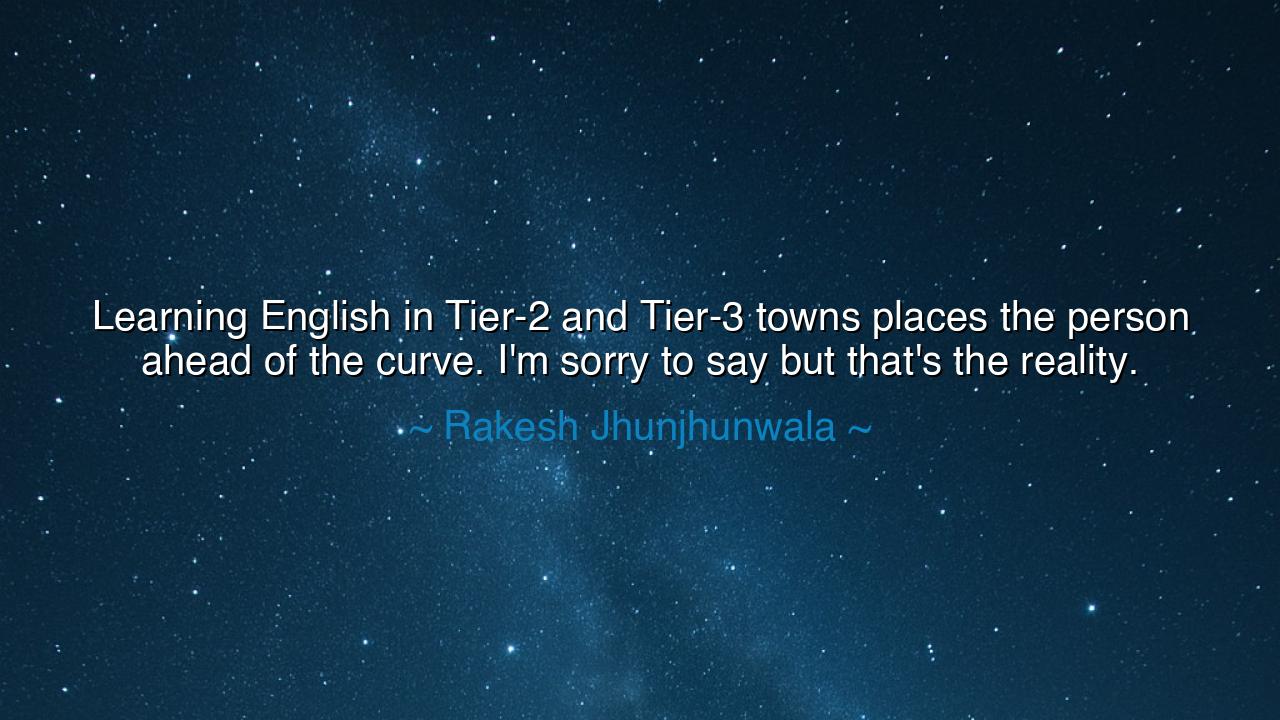
Learning English in Tier-2 and Tier-3 towns places the person
Learning English in Tier-2 and Tier-3 towns places the person ahead of the curve. I'm sorry to say but that's the reality.






“Learning English in Tier-2 and Tier-3 towns places the person ahead of the curve. I’m sorry to say, but that’s the reality.” — Rakesh Jhunjhunwala
These words, spoken by the late Rakesh Jhunjhunwala, the legendary investor and visionary of India’s markets, carry the weight of hard-earned truth — a truth born not from privilege, but from keen observation of the world’s changing order. Beneath his simple statement lies a profound lesson about language, opportunity, and the forces that shape destiny in modern society. He speaks not merely of English as a tongue, but as a bridge — a bridge that connects small-town dreams to the global stage, that opens doors closed by circumstance, and that transforms isolation into participation. His tone, half regretful and half resolute, reveals both compassion and clarity: he does not glorify the imbalance, but acknowledges it — for only by facing reality can one hope to rise above it.
To the ancients, language was not merely a tool of speech — it was power. The Greeks called it logos, the divine word that orders the universe; the Indians called it vak, the voice that gives creation its rhythm. In the modern age, English has become such a logos — not by divine decree, but by the weight of history and empire. It has grown into a vessel of trade, technology, and global discourse. To learn English, then, especially in the smaller towns and cities where exposure is scarce, is to seize a key that unlocks not only knowledge, but confidence — the ability to stand as an equal in a world still divided by access and articulation. Jhunjhunwala’s statement is thus both a warning and an encouragement: that in a world ruled by communication, language mastery becomes destiny mastery.
Consider the story of Dr. A.P.J. Abdul Kalam, born in the humble town of Rameswaram. His beginnings were modest — his father a boat owner, his home lit by the spirit of learning rather than wealth. Yet Kalam’s thirst for knowledge, and his commitment to mastering science and English, became the wind beneath his wings. The language gave him entry into higher education, into scientific circles, and finally, into the global conversation of innovation. But his purpose was never vanity; it was service. He used the language not to separate himself from his people, but to bring the world’s knowledge back to them. In him, we see the truth of Jhunjhunwala’s words: that learning English can indeed set one ahead of the curve, not as an escape from one’s roots, but as a means of elevating them.
Yet the quote also carries a bittersweet undertone — “I’m sorry to say, but that’s the reality.” These are the words of a man who knows the world’s imperfections. Jhunjhunwala, who rose from the middle-class streets of Mumbai to become one of India’s most powerful investors, understood both the potential and the inequality of opportunity. His sorrow is not for the language itself, but for the imbalance it represents: that access to English — and the systems it opens — remains a privilege unevenly distributed. His statement is not a celebration of English supremacy, but a pragmatic acknowledgment that in the modern economy, those who can wield the language possess an advantage. The wise, therefore, must not deny this truth, but use it as a call to action and empowerment.
For those in Tier-2 and Tier-3 towns, Jhunjhunwala’s insight carries a heroic challenge: that to learn English is to arm oneself with the tools of the age — to claim one’s place in conversations that shape the future. It is not a betrayal of one’s mother tongue, but an expansion of one’s world. The act of learning becomes a declaration of will: “I will not be confined by circumstance; I will rise.” Each word mastered, each sentence spoken with confidence, becomes a step toward freedom, both economic and intellectual. For in a world where opportunity often travels on the wings of communication, language becomes not a symbol of class, but of courage.
Yet, let us not mistake the message. Jhunjhunwala’s wisdom is not that English is superior — but that learning itself is liberation. The reality he describes may favor English today, but the deeper truth he implies is eternal: that those who adapt, who learn continuously, and who seek understanding beyond their borders will always rise. The curve will change, the world will shift, but the spirit of learning will forever remain the path to advancement. To learn a language — any language — is to expand the mind’s horizon and sharpen its vision.
So, let this lesson be passed down as guidance to the generations that follow: in whatever land you are born, in whatever tongue you speak, do not fear to learn what the world values. Learn it not to imitate, but to innovate; not to lose yourself, but to strengthen your voice. If you live in a small town, let your ambition be vast as the sky above it. Let English be your bridge, but let your integrity be your foundation. For as Jhunjhunwala reminds us, the world may be unequal, but the human spirit need not be. Through learning, through perseverance, and through belief in one’s potential, even the quietest student from the smallest town can stand before the world — ahead of the curve, unafraid, and undeniably free.






AAdministratorAdministrator
Welcome, honored guests. Please leave a comment, we will respond soon